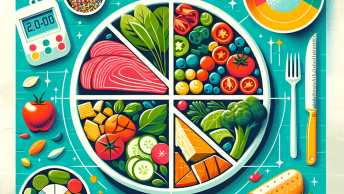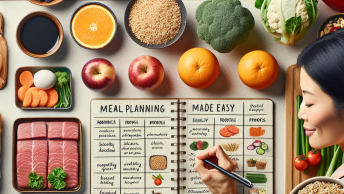10 Essential Tips for Crafting an Effective Fat Loss Meal Plan
Embarking on a fat loss journey is not just about finding the time to hit the gym; it’s about making smarter food choices that fuel your body and promote a healthier lifestyle. Crafting a meal plan that aligns with your fat loss goals requires careful planning and dedication. Here, we unravel 10 essential tips to guide you through crafting an effective fat loss meal plan.
1. Determine Your Daily Caloric Needs
Understanding your daily caloric needs is the first step in creating a meal plan for fat loss. Utilize online calculators to estimate your Basal Metabolic Rate (BMR) and consider your physical activity level. By maintaining a calorie deficit, you’ll prompt your body to burn stored fat for energy. The key is achieving the right balance to ensure you’re not depriving your body of essential nutrients.
2. Focus on Nutrient-Dense Foods
Swap out calorie-dense, nutrient-poor items in favor of whole, nutrient-rich foods. Vegetables, fruits, lean proteins, whole grains, and healthy fats should form the core of your meals. These foods not only provide essential vitamins and minerals but also help increase satiety, meaning you’ll feel full longer and resist unhealthy snacking.
3. Incorporate Lean Proteins
Lean proteins like chicken breast, turkey, tofu, and legumes are your allies in fat loss. They help build and maintain muscle mass, which in turn enhances your metabolism. Plus, protein-rich foods have a thermic effect, meaning your body burns more calories digesting them compared to fats or carbohydrates.
4. Prioritize Healthy Fats
Not all fats are created equal. Incorporate healthy fats from sources like avocados, nuts, seeds, and olive oil. These fats support cell function and hormonally balance your body, aiding in overall health. Just be cautious with portion sizes, as fats are denser in calories than proteins or carbs.
5. Opt for Complex Carbohydrates
Eliminate refined sugars and grains, choosing instead whole grains like quinoa, brown rice, and oats. Complex carbohydrates provide sustained energy throughout the day and prevent the blood sugar spikes associated with simple sugars, which can lead to fat storage.
6. Hydrate Strategically
Never underestimate the power of water in your fat loss journey. Adequate hydration aids in digestion, helps control hunger, and can even raise your metabolism. Water-rich foods like cucumbers, tomatoes, and melons can also assist in meeting your hydration goals. Supplement your water intake with herbal teas or infused waters for variety.
7. Plan and Prep Meals in Advance
Prepping meals ahead of time is crucial for staying on track with your fat loss goals. Allocate a couple of hours each week to plan your meals, create grocery lists, and prepare ingredients. Having ready-to-eat meals can curb the temptation to opt for unhealthy, convenient options.
8. Be Mindful of Portion Sizes
Even healthy foods can contribute to weight gain if eaten in large quantities. Measure portions accurately to ensure you’re consuming the right amount of calories. Invest in kitchen scales or use visual guidelines, like a deck of cards for meat portions or a tennis ball for pasta, to help maintain portion control.
9. Monitor Progress and Adjust Accordingly
Track your progress not just by the scale but also through body measurements, clothing fit, and energy levels. This holistic approach can provide a clearer view of your progress. Be prepared to adjust your meal plan based on what’s effective or not – flexibility is key to long-term success.
10. Seek Additional Resources
For many, crafting a meal plan can be overwhelming. Therefore, leveraging external resources can be incredibly beneficial. There are various tools and programs tailored to simplify the process, offering guidance and inventive meal ideas. If you’re looking for a structured, reliable plan, consider exploring in-depth resources equipped to support your journey. Click Here to learn more about an effective program designed to enhance your meal planning efforts, keeping you on track and motivated throughout your fat loss journey.
Conclusion
Creating a meal plan for fat loss is a strategic process that goes beyond traditional dieting techniques. It’s about understanding your body’s needs, adopting a balanced approach to nutrition, and maintaining consistency. These 10 tips are your starting point; with dedication and the right resources, you can achieve your goals. Remember, a successful fat loss plan not only transforms your physique but also fosters a sustainable, healthy lifestyle.






